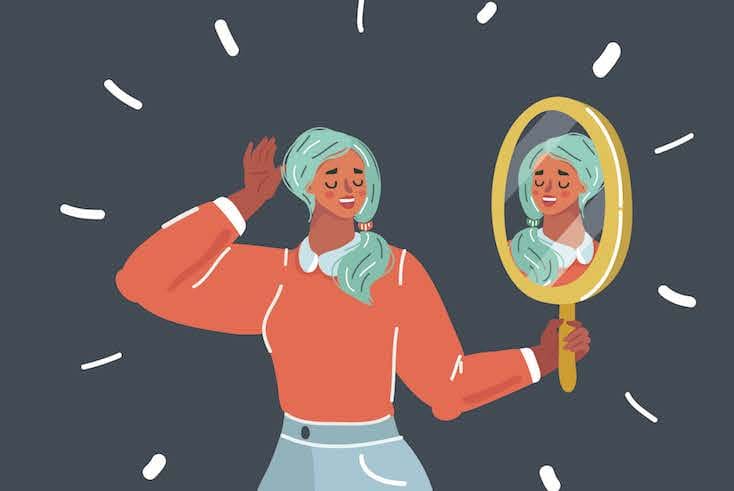May 11, 2020
By Kathleen Donohue
 It’s like flicking on a light switch. If you’ve struggled with your mental health, then you know what I’m talking about. Triggers. And once the light is on, sometimes you feel like you’re suddenly flying the Millennium Falcon, and you don’t know what you’re doing or how to turn off any of the blinking lights and buttons.
It’s like flicking on a light switch. If you’ve struggled with your mental health, then you know what I’m talking about. Triggers. And once the light is on, sometimes you feel like you’re suddenly flying the Millennium Falcon, and you don’t know what you’re doing or how to turn off any of the blinking lights and buttons.
I’ve struggled with depression, suicidal ideation, self-harm, anxiety and panic attacks for most my life. My “demons,” you could call them. In my first year of college, I was visited by a new one: eating disorders (ED). This was uncharted territory for me, and it would begin a long road of mapping, blueprint making, and one of the most laborious tasks of all — learning to truly love myself.
I started recovery from ED in the summer of 2017, just a couple months shy of turning 21 years old, while volunteering as a mental health professional on the dust-swept, cattle and elephant-filled roads of Sri Lanka. It was amongst the sites of jungles, mountains and temples where it dawned on me that I had no choice but to begin recovery.
The models in Sri Lanka that were pasted on billboards and shop windows were far from our Western images of what is considered beautiful. The skin of their torso rolled over their saris. Their full faces looked innocently into the camera, and they were indeed beautiful.
Back home, the body-positive movement was only beginning to take ground, at least in my circles of bikini-clad Florida. And while living in Sri Lanka, it became clear to me that to be told you had gained weight was a compliment, and similarly, to be told you had lost weight, meant that something was wrong. You must not be eating, so you must not be happy.
So here I found myself, completely immersed in a country, culture and language I did not know, without any control over what or when I ate since the usual options for breakfast, lunch and dinner were almost exclusively rice and curry. I had no control over when I exercised since my schedule was filled to the brim with work and weekend travel with other volunteers.
Something happened through this almost unbearable discomfort. I began to see myself as beautiful not for what I saw in the mirror, but what I was capable of doing in the world; how I contributed to making others laugh, dance, feel heard, get well. The girl in the mirror who did those things, I could finally see, was so beautiful.
When I returned to the States, I was determined to fiercely believe in this beauty, that ED did not control me. I won’t lie and say that path has been an easy or pretty one. But two and a half years later, I can say that it has been one worth walking on.
When coronavirus lockdowns and quarantine were put into play, I was naive in thinking my mental health would not be so affected. Before this happened, I was busy. I had three part-time jobs on top of being a full-time master’s student. But now I found myself at home, inactive. Though my usual activities had been taken away, my demons and their light switches certainly had not.
I was in the Millennium Falcon again, appalled at how suddenly I arrived there. However, I was, to my own surprise, excited. I knew what buttons to press and how to navigate. I looked my demons in the eyes, and I knew I was stronger than they were.
Through the help of following other ED survivors on social media, I began to make myself aware of a few things:
If you’ve been struggling with an ED during this time, or any mental health challenge, please know that you are not alone. Reach out to loved ones, find a support group, talk to a professional or find what works for you.
When I’m working out, I remind myself that I do it for fun. And I bask in the sunshine or the cloudiness. I’ll even purposefully slow down just to smile and enjoy it. When the anxiety hits, and I feel the moment come where I could lose control, I take a deep breath, I think of how far I’ve come, and I remind myself of how much more joyful I am in recovery.
Those tougher moments, they’re okay too. I look at myself in the mirror, and I see a body that has survived so much harm from myself and others. I see a body that houses who I am on the inside, someone I have fought to love and care for deeply. Because of this, I see someone who is so beautiful, and that is very, very okay.
Kathleen (Katie) Donohue is a NAMI Ending the Silence presenter in NAMI Greater Orlando, Florida, a mental health public speaker on the local, statewide and national level, and a NAMI Young Adult Advisory Group member. She is currently pursuing a M.S. in Mental Health Counseling and laughs excessively at her own jokes.
We’re always accepting submissions to the NAMI Blog! We feature the latest research, stories of recovery, ways to end stigma and strategies for living well with mental illness. Most importantly: We feature your voices.
LEARN MORENAMI HelpLine is available M-F, 10 a.m. – 10 p.m. ET. Call 800-950-6264,
text “NAMI” to 62640, or email. In a crisis, call or text 988 (24/7).